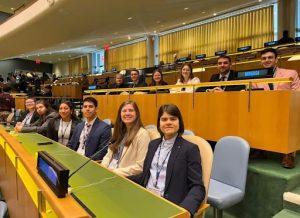In the first week of April, students in Dr. Andy Miller’s PS-341: Model UN course traveled to New York City to participate in the National Model United Nations Conference. For one week, students participated in simulated UN sessions, writing resolutions and collaborating with students from other universities on draft resolutions.
The real United Nations is made up of 193 Member States and two Observer States. All states have the power to speak, and negotiate, but only Member States may sponsor a resolution and vote on measures. The two Observer States are the Holy See and Palestine.
States, be they observers or members, serve on various committees with the goal of creating and implementing global policy relevant to the topic of the committee. At Model UN, universities take up the mantle of a specific delegation, role-playing as the country and attempting to write resolutions that the real country would create. At the end of the week, resolutions are voted on and adopted by the entire body. Model UN is a Wilkes University tradition, and Wilkes is one of the universities that has been attending for the longest amount of time.
“It’s a really good experience for students to learn the perspective of the country we are representing and the United Nations,” Miller said. “It shows them how to negotiate and work with others, and they get to meet people from all over the world, since there are around 5,000 students, and half of them are from outside the U.S.”
This year, Wilkes University represented the Holy See, better known as Vatican City.
“I try to have a different experience for students every year and the Holy See is really unique,” Miller explained. “It’s an Observer, but relatively powerful behind the scenes, so it gives students a different perspective”.
Junior criminology and political science student Emma Stout explained that she took the class to fulfill a major requirement. As a student in the honors portion of the class, Stout served as Head Delegate, which granted her extra opportunities and work.
“I had to pick up all our passes, make sure everyone was where they were supposed to be, and I took on a more observing role in order to learn from our other head delegate, Emma Guzdek,” said Stout.
The week was full of “Working Sessions’”, where students would gather in their committees. After Roll Call, a “Speaker’s List” was open, where students had the opportunity to stand in front of the room and, as their country, explain their thoughts on the issue at hand and convince others to agree to their resolution.
Marytere-Quintana Avila, a junior studying communication studies and political science, shared what the average “Working Session” looked like.
“I was in the United Nations Environment Assembly, or UNEA. I worked on the implementation of the Montreal Global Biodiversity Framework,” said Avila.
Following the Speaker’s List, students were called to motion for one of a few options: expand or shorten the Speaker’s Time, vote on a resolution (which was saved for the final day), or, the most common option, begin an Informal Session. “Informal Sessions were the times that we had to actually work on a resolution. We’d gather in groups and discuss what should be done, how it should be implemented, and actually write it out. Because we were the Holy See, we couldn’t sponsor certain papers, so a lot of my work was observing, sharing ideas, and ensuring the well-being of all people were considered and respected.”

Each student took away something different from the Model UN experience.
Stout said, “I loved the experience of being able to not only take part in this conference, but also see the city for a whole week.”
Even faculty take something away.
“Seeing students take what they learned, negotiate, and work with other delegations towards Model UN Resolutions is my favorite part,” said Miller
For many, the best part of the conference was the final day: a Closing Ceremony at the United Nations Headquarters in New York City.
Quintana-Avila said, “It was very inspirational, being able to sit in the seats where ambassadors from all over the world work on implementing legislation. That, and being able to share that space with all the other students there.”
Wilkes will not know which state they will be representing in Spring 2025.
Miller explained that universities submit a “top ten” list in November, and hear back from the conference before the start of the new year. Stout said that, no matter what state Wilkes will be representing she will, “definitely be back.”
If you’re interested in Model UN, sign up for PS-341 in the Spring 2025 semester.